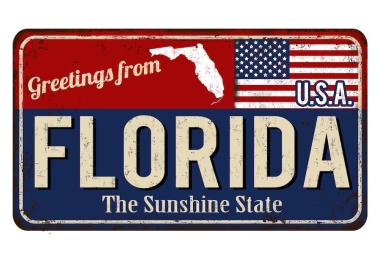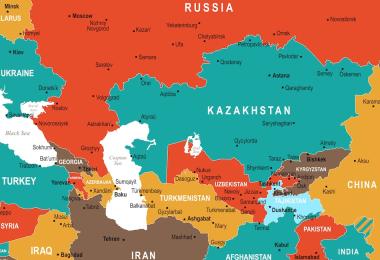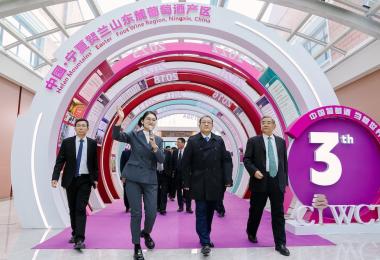In Italy, where the wine world mostly consists of small, family-run wineries, there is a behemoth that stands out: Gruppo Italiano Vini (GIV), Italy’s biggest wine producer and part of the cooperative Cantine Riunite & CIV. GIV owns 1,733 ha of vineyards across 11 regions, and owns 15 wineries: Bolla, Santi, Folonari, Lamberti in Veneto, Nino Negri in Lombardy, Ca’ Bianca in Piedmont, Cavicchioli in Emilia Romagna, Machiavelli and Melini in Tuscany, Bigi in Umbria, Conti Formentini in Friuli, Fontana Candida in Lazio, Re Manfredi in Basilicata, Castello Monaci in Puglia and Tenuta Rapitalà in Sicily. Its turnover in 2019 was €227m, of which 76 percent came from exports.
Despite its size, GIV is a flexible organization, as each of its many companies operates independently, joined together by central services including administration, legal, human resources and marketing and communications. It is headquartered in Calmasino, a pretty Lake Garda village near Verona.
Roberta Corrà, who joined GIV eight years ago, became the general manager five years ago. Although her training is in law, she was the human resources manager of a large food distribution retailer, and then the human resources operation manager of a consumer electronics brand.
Meininger's: Your educational background and professional experience are a long way from wine. What was your first impression of the largest Italian wine company?
Corrà: I was fascinated by the type of business, although it was new for me. It’s always nice when you have to deal with products related to the land. The size of the company did not worry me, because I have always worked with large companies; however, I had to learn a lot of new things. The wine world has many facets to know, regulations to take care of. This world has always attracted me – my father worked in Santi, a company of the group.
Meininger's: What changes did you make at GIV?
Corrà: It was gradual. When I started as HR and organization manager, I spent the first six months going from winery to winery to study all the processes from the point of view of their efficiency and usefulness. I analysed the resources and the needs, both for the productive and agronomic part and for the industrial and commercial part. I studied processes and individuals, restructured the company, added and removed people depending on the situation and the needs. I completely overhauled the organization of the company and made it more efficient in its various processes.
Meininger's: So, your main point of strength is…
Corrà: A great organizational ability. I see all the activities as processes, and try to make each of them more efficient. I try to understand the strong sides, the weak sides, and the skills of people, and figure out immediately if a process is efficient or not, and what is wrong, or if people are suitable for it. In my opinion, there is no right or wrong person in a company – there is the person in the wrong role. Or at the wrong time.
Meininger's: What is the main strength of GIV?
Corrà: Flexibility. The ability to adapt to changes. To be able to face new problems and opportunities, always.
Meininger's: …and its greatest weakness?
Corrà: The fact that it takes so long to build an image as a quality company. We are a firm in good financial health; in the last eight years have invested a lot, launched new wines, made acquisitions, and opened an e-commerce platform and three restaurants. Our goal is to reach the various types of consumers by offering them the most suitable wine. Despite all that, many people think we are just “one big company” and, as such, we cannot make quality wines. This is not true, and we are committed to build a new image for this company.
Meininger's: The 15 wineries of the group are located in many regions, and each of them is supposed to operate relatively independently. How do you make decisions?
Corrà: Actually, each winery is self-sufficient. The winery manager is the person in charge of everything: he can buy raw material and equipment, or hire people. Every year the winery manager meets the people in charge of the institutional marketing and communication and agrees with them on projects and initiatives.
Meininger's: GIV produces 99m bottles; each year. Are these mostly sold in the on-trade or off-trade?
Corrà: Both. We completely split the modus operandi and the processes from a strategic point of view. For the large-scale distribution, the logistics, the volume of the products and the promotional activities are important aspects; for the on-trade, the packaging or the training of people are more relevant. They are different approaches. That’s why we have trained people to give the right message according to the segment they are addressing.
Meininger's: The Covid-19 pandemic has heavily affected the world economy, wine included. What is your strategy for getting through it?
Corrà:We aren’t going to do anything. We are not going to throw ourselves on the retail market, nor look for new markets. I am just careful about costs. I try to be as efficient as possible, and have postponed the projects planned for the next year, except for the very urgent ones.
Meininger's: Speaking about Millennials and the younger generations in general, what are you doing to attract them to the wine?
Corrà: We don’t produce any wine for the Millennials, unlike many producers who adapt the wines according to the audience they want to reach. We attract young people with our Instagram account which is connected to our e-commerce. That is our communication: in the e-shop, we talk to them about our wines, the territories, the grapes, the different soils, the suggested pairings.
Meininger's: You’re talking about Vinicum, the GIV online wine shop.
Corrà: Exactly. Three years ago we undertook a market survey to figure out the potential of e-commerce for wine. Italy did not come out very well. We decided to open the online store anyway, because we need to target a well-defined group of people. We made a website where there is a lot of training about wines and wineries.
Meininger's: Did you benefit from it the lockdown, which forced many Italians to buy wine online?
Corrà: Absolutely. When we opened the e-shop we had planned to reach one million euros of online sales in three years. This year we have already sold wine for €700,000. And the year is not yet over, including Christmas selling. The e-shop works like a charm. I’m very satisfied.
Meininger's: In 2016, GIV signed an agreement with the Chinese e-commerce giant Alibaba to open a flagship store on the TMall platform. How was the experience?
Corrà: It was not positive. I learned that Alibaba is the only one who always earns! Alibaba rented us a space to sell our wines, and we had to hire an agency to take care of it. Personally, I don’t believe in the Chinese market, unless we’re targeting people who are educated, open-minded and keen of something exotic. Well, for those Chinese consumers the exotic is us. But that kind of audience is a niche.
Meininger's: Due to the current situation, today the interest rates are low, so maybe this is a good time for acquisitions. Are you likely to acquire new wineries?
Corrà: No.Not soon, at least. There are some areas that we are keeping an eye on, [such] as the South Tyrol, but there is still nothing on the table.
Meininger's: What do you look for in a winery before bringing it to the group?
Corrà: You should ask this question to three different people: the oenologist, the agronomist, and me. I can reply just from a strategic point of view: I’d look for what we lack. I wouldn’t acquire something just because it’s fashionable, because we can do everything – research, innovation, new projects – with what we already have.
Meininger's: Which region of Italy do you think is undervalued, which could be a strong area in the future?
Corrà: Currently we are focusing a great deal on Basilicata. It was the choice of my predecessors in the past years. In southern Italy, GIV already had a company in Puglia and another one in Sicily, so an investment was made in Basilicata. This is a beautiful region, with great potential. In the last six years, we have been regularly awarded by the wine guides for the wines of Basilicata.
Unfortunately, it’s very difficult to communicate as a region. Now we are investing €3m to rebuild the Re Manfredi winery, expand it and equip it with a wine shop. That’s also why we opened the restaurant Taverna Re Manfredi opened in Matera, to attract visitors and tour operators in the area.
Meininger's: Right now we are sitting in a restaurant managed by GIV. Are you working towards developing hospitality?
Corrà: Yes. In the short to medium term, hospitality is the sector we are going to invest in, and I’ll tell you why. Let’s go back to the consumer, to the Millennials in particular. How can I reach them? With digital communication, Instagram, e-commerce, OK, but the most effective way is when someone speaks to them about wine in a restaurant in person. Or even in a bistro, as in our Uno Due Tre - Vino Cucina Caffè in Praga. In the future we are going to open other restaurants. In Paris, or maybe in Tokyo. Obviously, this is not our core business, so we have to take care of everything in an even more maniacal way.
Meininger's: Pandemic aside, what are your main concerns among Brexit, US tariffs, and falling Italian exports?
Corrà: Brexit has never worried me. In the UK we have a very small on-trade market while being very strong in the off-trade where we supply chains such as Tesco, Sainsbury’s, Morrison, and Waitrose, especially with private labels. What truly scares me are the US duties. First and foremost because we have Frederick Wildman and Sons. It’s a very large distribution company, with current revenues of almost $150m. In it, we hold 89% of the shares, and among the other partners there are names such as Famille Hugel, Champagne Pol Roger and many other renowned brands. We are the Italian gem of fine wines, because Frederick Wildman and Sons has always been a very French-speaking company, with a high reputation among distributors and retailers. The 25% confirmed American duties have painfully affected the business of French brands of the group. That terrified me because the company [is important for our turnover]. Furthermore, the duties could hit Italian wines, too. We export all over the world and the USA is our first foreign market. That’s why I was doubly worried, as a manager of an American company and as an exporter. The drop in exports is another problem, but more related to the fact that Italian wines are not recognized as valuable.
Meininger's: Speaking about America, a new consumption trend is cannabis-infused foods and drinks. What is your view of that?
Corrà: As a mother and a woman, I disapprove of cannabis consumption. As a businesswoman, I think that not all market opportunities should be taken. There are some that clash with the coherence of a style and message, and cannabis wine is one of them. Wine isn’t simply a drink, it is much more. Wine is the leaves to remove for the bunches to ripen, it’s the care of the land, the attention to the rhythms of Nature... It’s a lot of work. I cannot involve so many people in this work and then ruin everything by putting something in wine that has nothing to do with it just because it’s fashionable.
Meininger's: GIV’s top brand is Bolla. In online reviews, consumers often are amazed that the wines offer such good value for the price. Couldn’t the imbalance between price and perceived quality be detrimental to the company’s image in the long term?
Corrà: This issue has my full attention. It is not only a problem of Bolla wines but also of Nino Negri’s wines, of Re Manfredi’s wines... The problem is the knowledge of the brand and the wine. It takes time to make the brand and the quality of the wine known. Speaking about Bolla, we are doing slow but uninterrupted work. For example, we are going to focus on organic wines, but it will take years. We are re-building the image of that historical winery. I realize that many prices are too low compared to the quality of the wine, but I cannot raise them from evening to morning. It has to be a gradual process. It needs time. Everything in the wine world needs a lot of time.
Meininger's: Nowadays everybody seems to be going crazy for the autochthonous grapes, yet the best selling wines in the world are the usual international varieties: Chardonnay and Cabernet Sauvignon. How big is the market of the native grapes?
Corrà: It’s small, even in Italy. But our rich ampelographic heritage is also our uniqueness. We must be able to communicate it better. How? By increasing the perceived value of wines and continuing to work on their quality.
Elisabetta Tosi
This interview has been lightly edited for clarity.








